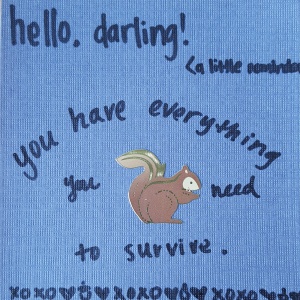
Yesterday, I attended the annual benefit luncheon for YWCA, one of our partners from Hack to End Homelessness. YWCA provides a safety net for women in our community by offering housing support, employment services, and the reassurance that women have somewhere to turn. As one of the speakers put it yesterday, what YWCA really does help women “get out of survival mode” – that stressed-out, fear-driven state where everything feels impossible.
Once they turn the corner from survival into life, these women go on to do amazing things. Eighty-six percent of people exiting YWCA housing facilities move on to more stable housing. Six in ten job seekers find work. Children (98 percent of those who participate in YWCA’s programs) go on to meet developmental milestones and/or enroll in kindergarten. The impact of simply caring for people’s basic needs is tremendous.
That should be no surprise to anyone. “Survival mode” is a killer – literally. When we believe that our survival is on the line, we live in constant fear. We avoid risks, even when those risks may be necessary to exit survival mode. We become emotionally unstable, viewing everyone around us as a threat, even those who are trying to help. This mental state reinforces itself, convincing us that there is no way out. It strikes me that the most important thing YWCA does for people is to be there for them, reassuring them that they will survive, and helping them shift toward medium-term and long-term solutions.
While not all of us have experienced the levels of personal, generational, and network poverty faced by one in three women-led households in the United States, we have all experienced “survival mode.”
- We’ve had to work for bosses who constantly hold over us the threat to fire us and destroy our reputations.
- We have been in relationships that we felt we could not live without, even when they were not meeting our needs.
- We have had long-dreamed-of opportunities within our reach and shrank back, terrified that we would not be able to manage the disruption to our known world.
Even when we are far removed from the true survival pressures faced by billions of people on our planet, we are stuck moving through life with cortisol and noradrenaline sabotaging us through our brains and bloodstreams. We gain weight, feel depressed, and worry about whether we’ll be okay.
The current social paradigm in the United States keeps us in survival mode all the time. We often disconnect from our family networks to pursue careers in what is referred to as a “dog-eat-dog world.” Everything, even doing good (or pretending to do good), is a competitive sport.
A scene from season two of HBO’s “Silicon Valley”
Does this seem insane to anyone else? Why, in an era of so much plenty, when for most of us, survival is a guarantee, do we continue to be stuck in survival mode? And what can we do to get out of it?
The answer is simple. “Survival mode” is a state of mind. It is harder to battle the closer you are to death, but even then, survival mode is a psychological state – one humans have been stuck in for most of our history, and one we are ready to transcend. To do so, we need to communicate to our egos that everything is going to be okay. Here are a few ways to do that:
First, we can remind ourselves what the edge of survival really looks like. Volunteering with or at least learning about the work of service providers like YWCA can show us just how okay we really are. Philanthropic giving gives us a psychological boost. These activities remind us that, at least from a basic-needs standpoint, we are going to be okay.
Second, we can think back to situations we thought we would never get out of, but somehow did. We may never wish to go back there, but we can eliminate the fear of survival by reminding ourselves that we have survived. We can thank the people who were there for us when things were not okay.
Finally, we can, very intentionally, create support networks in our communities, much like YWCA staff do for their clients. We can remind our friends that they will always have a place to stay and food to eat. We can help them think through the worst-case scenarios and let them know how we will be there for them if those scenarios comes to pass. Recognizing that we all go through times of shortage and plenty, we can create a social safety net of our own.
By living generously, we release ourselves and others from survival mode.
When that happens, we can all go forth and do great things. We can bring our gifts into the world – works of art, acts of service, feats of engineering, study of puzzling problems, resolution of conflict, inspiring stories, management of complex systems, leadership in difficult situations, the next generations of human life. By giving freely to one another, we not only ensure our own survival, we make life richer for ourselves and everyone around us.
So get out there. Know that you will survive. Build communities where no human is left behind. And then, together, let’s get past survival mode and into the life that awaits.
